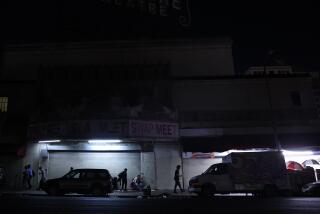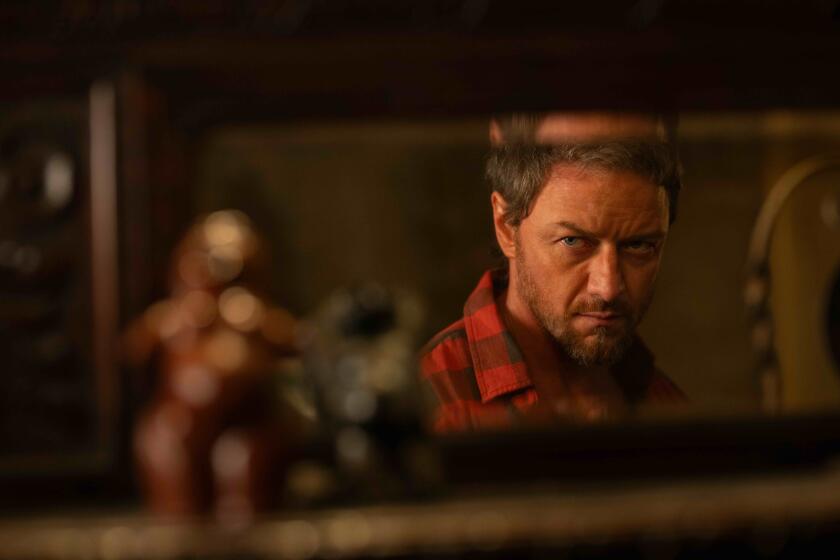Through ‘Step,’ moviegoers see a different side of Baltimore

“Step” tells the inspirational story of Baltimore teens’ triumph against the odds.
When most people think of Baltimore, the blue light district comes to mind — the area of the city doused in cobalt from police lights atop light poles in areas said to have high crime rates. This is what “The Wire” introduced millions to.
Others will flash back to the city’s burning buildings and cars broadcast to the world in April 2015 during community uprisings following the death of Freddie Gray, who died after sustaining spinal injuries while in police custody.
“But you always have the other side,” said Tayla Solomon, one of the city’s natives. “Everybody thinks of Baltimore as this dangerous place … so when you tell someone you’re from Baltimore, they ask, ‘Oh, is it really like “The Wire?”’ But every city has its violence and police, their drugs and alcoholism, and every city has its positivity as well.”
Solomon, who has just completed her first year at Alabama A&M University in Huntsville, is one of three young women at the center of the documentary “Step,” opening in limited release Friday. She hopes that after audiences see the film, which highlights a small community at the Baltimore Leadership School for Young Women, her city will have a better reputation.
“The next time I tell someone I’m from Baltimore, I want them to ask, ‘Is it really like “Step”?’ ”

“Step” is a documentary about a girls’ high school step dance team in Baltimore.
“Step” follows Solomon, Blessin Giraldo, Cori Grainger and their step team at an all-girls, college-prep public charter school in the city.
(For the uninitiated: Step is a percussive art form in which the body is used as an instrument to create complex rhythms and sounds using stomps, claps and spoken word. Deeply rooted in a rich African tradition, stepping is most often employed by black fraternities and sororities worldwide. It’s seen bouts of mainstream attention with films like Spike Lee’s “School Daze” and 2007’s “Stomp the Yard.”)
The three seniors are all members of the school’s first graduating class, and they share the goal of being the first in their families to go to college.
As is the case for most born black and low-income, life is rarely a crystal stair. In the words of Langston Hughes, it has “tacks in it and splinters and boards torn up and places with no carpet on the floor — bare.” But with the tough love of their principal, Chevonne Hall, coach, Gari McIntyre, and college advisor, Paula Dofat, success is on the horizon at Baltimore Leadership School for Young Women.
Filming for the doc started when the girls were in ninth grade. At the insistence of Giraldo — who had the idea to launch the step team as the school’s first elective after being introduced to it at Morgan State University — director Amanda Lipitz came to one of the group’s practices.

Step is just the vessel...
— Coach G
Lipitz had been around the school working on other projects when Giraldo, who had Broadway aspirations, got word of the former Broadway producer’s credits (“Dirty Rotten Scoundrels,” “Legally Blonde: The Musical”). After witnessing the 19-person team rehearse, Lipitz thought the group would be a great vehicle to help redefine the perception of the area where she too was born. She followed the young women, known as the Lethal Ladies of BLSYW (the school’s initials), or LLOB, for three years. Then Freddie Gray died.
“That just changed everything,” she said, noting that most of the film’s footage is from the final year of shooting. “When I watched my hometown burn on television, that was truly shocking. When I watched the mother go into the riot, pull out her son and hit him, I was, like, ‘Those are my mothers … on the step team.’ When [Gray] was killed, I think it gave the young women the strength and the courage to really go all the way, to really be open and devote a lot of their senior year of high school to me and my camera crew.”
The result is a well reviewed, heart-tugging hour and 23 minutes of a community trying to rebuff society’s expectations and thrive in spite of it. It won a special jury prize for “inspirational filmmaking” after it premiered at this year’s Sundance Film Festival.
“We didn’t think that our stories were inspiring or that interesting,” said Grainger, who majors in computer science and international studies and minors in Spanish at Johns Hopkins University. “It’s good to see people are taking life lessons from our stories.”
Take, for example, Giraldo’s story in the film. Although she’s the strong and vocal captain of the group, she wasn’t always academically focused; a low grade point average might leave her post-graduation visions for herself unfulfilled. Violence and depression within her home also take their toll. But Giraldo said she had no regrets throughout the filming process.
“I had a goal in mind and that was to inspire young women around the world who may be going through some of the same things, maybe even worse,” she said. “In order to get the full essence of who I am, you need to know where I come from and what I’ve been through. And while it doesn’t define who I am, it is part of who I am.”

The stars of the documentary “Step” perform during the screening of their Sundance premiere.
Giraldo just completed her freshman year at Baltimore’s Coppin State University, where she majors in business marketing with minors in graphic design and communications.
“When you look at my story, you see a girl trying to overcome a lot of struggles and adversity in her life,” she continued, “but at the end of the day, she’s in triumph. She started the step team, and look where it has gone. Her vision started this and with the help of her sisters, there’s a film that took us to Sundance. ... It started with a dream but ended with community.”
The film’s events take place against the backdrop of stepping, the way it’s meant to be, said McIntyre, a Baltimore native known affectionately as Coach G.
She came to the team well into its formation (as the sixth in a series of coaches) after a number of others were unable to stick around. Recommended for the job by one of her sorority sisters — she’s a member of the historically black Delta Sigma Theta Sorority Inc. — she saw an opportunity, through step, to mentor “these little black girls who looked like me.”
“Meeting them, I saw their drive in wanting to be stand-up citizens, and [I felt like I could] be someone they could look up to — especially since, no shade, they didn’t have the best role models … on Instagram and Facebook, but had a loving environment at the school,” she said. “I feel like I’m the bridge between that, because I know the culture and who’s poppin’ and who’s not. But I’m also going to hold you accountable because I love you and am going to be real with you.
“Step is just the vessel, but I’m instilling serious principles and life skills.”
And to those still looking at Baltimore negatively, she notes, “There are these pockets of joy in every community everywhere.”
Lipitz added: “We have to look for them and remind ourselves as citizens of this country to tell those stories.”
Get your life! Follow me on Twitter (@TrevellAnderson) or email me: trevell.anderson@latimes.com.
More to Read
Only good movies
Get the Indie Focus newsletter, Mark Olsen's weekly guide to the world of cinema.
You may occasionally receive promotional content from the Los Angeles Times.











